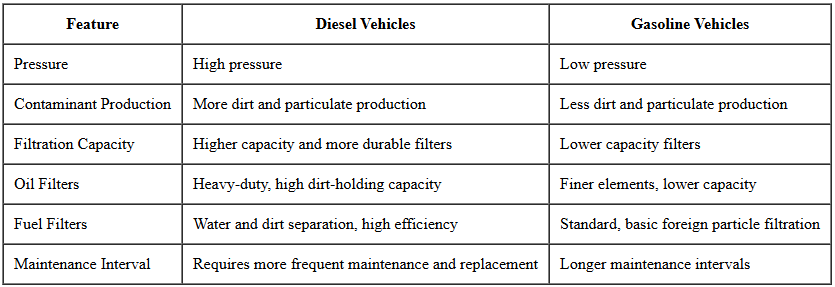
Filter Selection for Diesel and Gasoline Vehicles: Key Differences Explained
The filters used in diesel and gasoline vehicles differ significantly in terms of design, material quality, maintenance procedures, and their impact on engine performance.July 11, 2025
Filters are critical components in ensuring the longevity and efficient operation of vehicles. However, the filters used in diesel and gasoline vehicles differ significantly in terms of design, material quality, maintenance procedures, and their impact on engine performance. In this article, we will explore the key differences in filter selection between diesel and gasoline vehicles and provide guidance on how to choose the most suitable filter for each type of engine.
The Importance of Filter Selection for Diesel and Gasoline Vehicles
Both diesel and gasoline engines have different operating principles, which directly affect their filtration systems. Diesel engines operate under higher pressure and produce more exhaust gases, so their filters need to be more robust and have higher particle retention capacity. Gasoline engines, on the other hand, typically operate at lower pressures and produce cleaner combustion, but still require quality filtration. Selecting the right filter is crucial to ensure the engine operates efficiently and lasts longer.
Filter Selection for Diesel Vehicles
Diesel engines require filters that can withstand higher pressure and handle more contaminants due to their higher torque and fuel composition. Diesel vehicles commonly use the following filters:
- Oil Filters: Diesel engines produce more carbon particles and contaminants that lead to faster oil degradation. As such, oil filters for diesel engines need to have a higher dirt-holding capacity and be built to handle these larger volumes of contaminants.
- Air Filters: Diesel engines draw in a larger volume of air, which may contain more dust and particulates. Diesel air filters need to be made from finer materials with higher particle retention capacity to ensure clean air reaches the engine.
- Fuel Filters: Diesel fuel often contains higher levels of water and impurities. Diesel fuel filters are specially designed to separate water and maintain fuel cleanliness.
Important Note: Diesel filters need to be regularly replaced. Dirty filters can damage the engine, increase fuel consumption, and raise emissions.
Filter Selection for Gasoline Vehicles
Gasoline engines produce fewer exhaust gases but still require quality filters. The following filters are commonly used in gasoline vehicles:
- Oil Filters: Gasoline engines use oil filters to clean contaminants from the engine oil. These filters tend to have finer elements and a lower dirt-holding capacity compared to those used in diesel vehicles.
- Air Filters: Gasoline engines require clean air, but the particulates and dust are less intense compared to diesel engines. Therefore, air filters in gasoline vehicles generally have lower particle retention capacities.
- Fuel Filters: Gasoline fuel filters clean the fuel from foreign particles. However, compared to diesel filters, gasoline filters have a lower capacity for dealing with water and dirt particles.
Important Note: Gasoline vehicle filters also need to be changed regularly. Dirty filters can reduce fuel efficiency and shorten the engine's lifespan.
Key Differences Between Diesel and Gasoline Vehicle Filters

Şampiyon Filter’s Best Solutions for Filter Selection
Şampiyon Filter offers superior quality solutions for both diesel and gasoline engines. Our filters, developed for both types of engines, deliver optimal performance. Our R&D department uses the
- latest technologies to provide solutions for every type of air, oil, and fuel filter need.
- High torque and intensive dirt retention for diesel engines
- Energy efficiency and long-lasting filters for gasoline engines
- Custom-designed fuel filters with water separation and foreign particle filtration
Our filters ensure that the engines work efficiently in all conditions and help reduce maintenance costs.
What to Consider When Choosing a Filter
- Engine Type: Diesel engines require stronger filters. The type of engine you have is a key factor in filter selection.
- Operating Conditions: Temperature, humidity, and environmental factors can affect filter capacity. Choosing the right filter can enhance engine performance.
- Filter Maintenance Interval: Regular maintenance extends the engine’s life. It is important to determine how frequently the filter should be replaced.
Choose the Best Filter Based on Your Needs
Filters are critical for engine efficiency and longevity. Şampiyon Filter offers the most suitable filters for both diesel and gasoline vehicles. Selecting the right filter will not only ensure a long engine life but also reduce maintenance costs. For the best performance in both diesel and gasoline engines, choose Şampiyon Filter.


